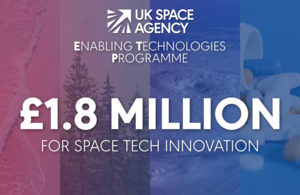The UK Space Agency has invested £1.8m (US$2.2m) in technologies to help satellites measure Earth’s changing shorelines, estimate levels of biomass, predict weather forecasting and manufacture medicines in space.
Andrew Griffith MP, Minister of State at the Department for Science, Innovation and Technology, said, “From more accurate weather forecasts to manufacturing medicines on a bigger scale, ambitious UK space teams are developing pioneering solutions in space to enhance our life on Earth. This £1.8m government fund will grow our economy through new innovation while helping to keep space sustainable and deliver more key discoveries for many years to come.”
The projects
Argans – Global shorelines capability
Satellite remote sensing company Argans has received £250,000 (US$312,000) for its ‘Global shorelines capability’ project. This Earth observation satellite applications project aims to map global coastline trends, especially for regions of the world with limited geospatial information, enabling generation of accurate shorelines. Potential uses include climate change monitoring and coastal management planning.
Warwick and ICL – Space applications of nitrogen vacancy-in-diamond magnetometer
The UK Space Agency has also awarded The University of Warwick and Imperial College London £250,000 (US$312,000) for their joint ‘Space applications of nitrogen vacancy-in-diamond magnetometer’ project. This project will include the development of magnetometers using nitrogen vacancy center in diamond, potentially offering a competitive alternative to traditional fluxgate sensors. Magnetometers are devices used to measure the magnetic field, with applications ranging from planetary science missions to weather forecasting on Earth.
Surrey Space Centre – Enabling ultra-low orbits: air breathing electric propulsion spacecraft
The Surrey Space Centre at the University of Surrey has received £250,000 (US$312,000) for its project, ‘Enabling ultra-low orbits: air breathing electric propulsion spacecraft’. This will include the development of a spacecraft platform capable of flying in extremely low-altitude orbits, advancing the air breathing electric propulsion concept through propulsion testing, orbital mechanics simulation and aerodynamic analysis for use in Earth observation, telecommunications and climate monitoring.
Additionally, the UK Space Agency also awarded funding to the University of Derby, Messium, Ultima Forma, Northumbria University, the University of Strathclyde and Frontier Space Technologies.
Enabling Technologies Programme (ETP)

The investment, divided across nine individual projects, rounds off the final phase of the agency’s Enabling Technologies Programme (ETP), designed to give a boost to British organizations with promising technologies to support the delivery of new space capabilities.
Launched in September 2022 in partnership with the UKRI Science and Technology Facilities Council, the £8.6m (US$10.7m) ETP has already supported 41 emerging technologies that are expected to drive growth in the UK space sector. The ETP has now been incorporated into the National Space Innovation Programme (NSIP) and will be delivered as NSIP Kickstarter.
Dr Paul Bate, chief executive of the UK Space Agency, commented, “From using satellite observations to gain a clearer picture of the way our planet is changing, to using the in-orbit environment itself to develop vital tech products more efficiently, space is central to how we can plan for a safer and more sustainable future on Earth. For almost two years, our ETP has been empowering scientists and engineers in universities, companies and research institutes to advance the technologies of tomorrow, demonstrating the UK Space Agency’s commitment to harnessing the power of space to improve life for everybody.”
In related news, EUMETSAT recently hosted a workshop at its headquarters to create a roadmap for cooperation that would enhance the use of satellite data for water management in Africa. Click here to read the full story.



